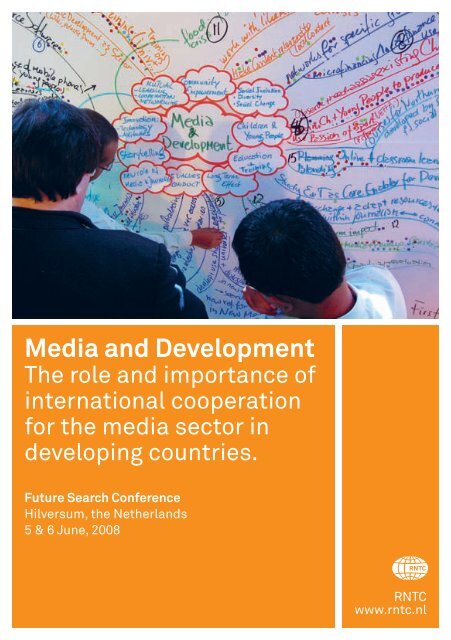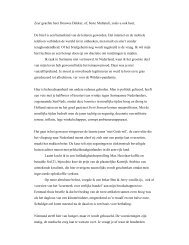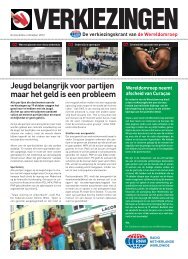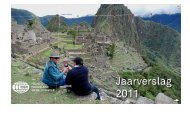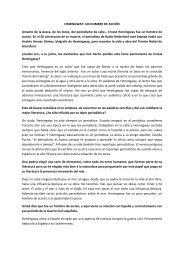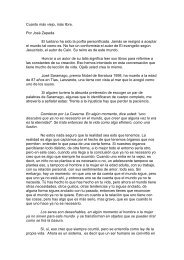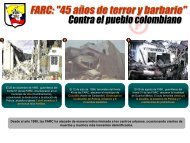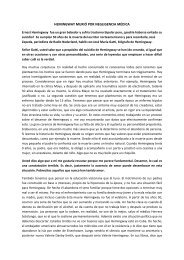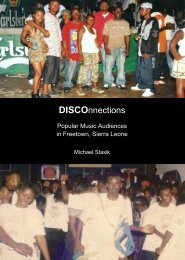Media and Development - RNW - Radio Netherlands Worldwide
Media and Development - RNW - Radio Netherlands Worldwide
Media and Development - RNW - Radio Netherlands Worldwide
You also want an ePaper? Increase the reach of your titles
YUMPU automatically turns print PDFs into web optimized ePapers that Google loves.
<strong>Media</strong> <strong>and</strong> <strong>Development</strong><br />
The role <strong>and</strong> importance of<br />
international cooperation<br />
for the media sector in<br />
developing countries.<br />
Future Search Conference<br />
Hilversum, the Netherl<strong>and</strong>s<br />
5 & 6 June, 2008<br />
RNTC<br />
www.rntc.nl
<strong>Development</strong> of media<br />
<strong>Media</strong> for development<br />
www.rntc.nl
Foreword<br />
Lem van Eupen<br />
General Manager RNTC<br />
In 1968 RNTC was established by <strong>Radio</strong> Netherl<strong>and</strong>s <strong>Worldwide</strong> <strong>and</strong> the<br />
Netherl<strong>and</strong>s Ministry of Foreign Affairs to strengthen media in developing<br />
countries. Established as an institute for international education, RNTC has<br />
developed over the years into a centre of excellence in the field of media,<br />
education <strong>and</strong> development.<br />
On the occasion of its 40th anniversary, RNTC invited stakeholders in the<br />
field of media <strong>and</strong> development for a two-day conference, held in Hilversum<br />
on June 5-6, 2008, on “<strong>Media</strong> <strong>and</strong> development: future scenarios for<br />
international cooperation”.<br />
The conference was set up according to open space methodologies such as<br />
Future Search <strong>and</strong> Appreciative Inquiry, thus providing an interactive <strong>and</strong><br />
participative environment for the participants. Over sixty professionals<br />
from broadcast media in the North <strong>and</strong> the South, NGOs working in the field<br />
of media <strong>and</strong> communication, government agencies <strong>and</strong> policymakers,<br />
donors <strong>and</strong> development partners, educational institutes <strong>and</strong> training<br />
organisations, gathered in different sessions <strong>and</strong> brought in their<br />
knowledge <strong>and</strong> experience to draw up inspiring scenarios for the future.<br />
They came from all over the world: all in all from 30 different countries,<br />
including 23 developing countries <strong>and</strong> countries in transition.<br />
This report is an attempt to give a reflection of the vibrant discussions<br />
<strong>and</strong> exchange of knowledge <strong>and</strong> experience during the two days of<br />
the conference. We provide some background information about the<br />
methodology used, <strong>and</strong> we describe the key themes that came up in the<br />
different sessions. The cartoons included in the report are an artistic<br />
impression of the topics that were raised during the working sessions.<br />
Partnership, interactivity, mutual learning <strong>and</strong> participation have been<br />
key words in the work of RNTC since its inception in 1968. The conference<br />
illustrated this.<br />
It was an active <strong>and</strong> inspiring two days which produced ‘a portfolio of ideas’,<br />
shared experiences <strong>and</strong> common values, cross-cutting contacts <strong>and</strong> fertile<br />
soil for future international cooperation. For most participants the process<br />
was an exciting adventure, which not only brought them new knowledge<br />
<strong>and</strong> ideas, but also introduced them to a new participative methodology of<br />
planning <strong>and</strong> learning.<br />
It is our sincere wish that, using the positive energy that was generated<br />
by this conference, we can make these dreams come true in the decade to<br />
come.
4<br />
<strong>Media</strong> <strong>and</strong> development<br />
Introduction to the theme<br />
CHAPTER 1<br />
According to estimates, around 1 billion people are living at the margins of survival<br />
on less than US$1 a day, with 2.6 billion – 40 percent of the world’s population –<br />
living on less than US$2 a day. These people lack the basic needs for a minimum<br />
st<strong>and</strong>ard of well-being <strong>and</strong> life, such as food, shelter, clothing, <strong>and</strong> safe drinking<br />
water. Even more people suffer from what can be called ‘social poverty’, the lack of<br />
access to information, education, health care, or political power. This may lead to<br />
dependency <strong>and</strong> social exclusion, a diminished capacity to participate in society or<br />
to develop meaningful connections with other people.<br />
Governments alone cannot address the challenges of development – an active <strong>and</strong><br />
vibrant involvement of citizens <strong>and</strong> civil society is required to diminish poverty, to<br />
resolve conflicts <strong>and</strong> to build peace, to ensure citizen participation in governance,<br />
<strong>and</strong> diversity within societies.<br />
<strong>Media</strong> play a fundamental <strong>and</strong><br />
nurturing role in development. They<br />
<strong>Media</strong> can inform <strong>and</strong> educate<br />
can inform <strong>and</strong> educate people –<br />
equipping them with the tools to make people – equipping them with the<br />
informed decisions <strong>and</strong> to improve<br />
tools to make informed decisions<br />
their lives. They can offer a platform for<br />
dialogue <strong>and</strong> debate, where voices are<br />
<strong>and</strong> to improve their lives.<br />
heard, ideas exchanged <strong>and</strong> opinions<br />
formed. They can help foster social<br />
cohesion <strong>and</strong> bridge gaps between<br />
different groups in society. They can support the creation of an environment for<br />
transparency <strong>and</strong> responsive governance in which accountability is promoted <strong>and</strong><br />
corruption counteracted.<br />
<strong>Media</strong> <strong>and</strong> <strong>Development</strong> | Chapter 1 Introduction to the theme 5
6<br />
Both in developing countries as well as in countries in the North, governments,<br />
non governmental organisations, media organisations <strong>and</strong> individual programme<br />
makers are involved in projects <strong>and</strong> programmes focusing on strengthening the<br />
role of media in development. Cooperation, often on an international level, is<br />
essential in this.<br />
What are the dreams <strong>and</strong> needs of media <strong>and</strong> development organisations both in<br />
the North <strong>and</strong> in the South? What are the lessons learned? How can we draw upon<br />
those lessons <strong>and</strong> benefit from it to design appropriate <strong>and</strong> innovative initiatives in<br />
the field? What can international cooperation contribute to realise this?<br />
In the two day participatory conference organised by RNTC these questions<br />
were raised <strong>and</strong> discussed. Current themes were identified <strong>and</strong> were translated<br />
into future scenario’s. At the end of the two days, six action plans were made to<br />
strengthen the role of media <strong>and</strong> development <strong>and</strong> to stimulate international<br />
cooperation.<br />
<strong>Media</strong> <strong>and</strong> <strong>Development</strong> | Chapter 1 Introduction to the theme 7
8<br />
Methodologies <strong>and</strong> process<br />
The Methodologies Used: Future search <strong>and</strong> Appreciative inquiry<br />
CHAPTER 2<br />
RNTC chose to combine two methodologies that are used in open space settings<br />
for the purpose of this conference: Future Search <strong>and</strong> Appreciative Inquiry. Both<br />
methodologies are used to facilitate interaction in large groups, ensuring that<br />
everyone has the opportunity to contribute <strong>and</strong> to articulate their point of view.<br />
Future Search methodology is often used by RNTC in the first stage of a project to<br />
bring all the stakeholders together, generate broad support <strong>and</strong> create a common<br />
underst<strong>and</strong>ing of the roles <strong>and</strong> responsibilities of the different stakeholders.<br />
Appreciative Inquiry is a particular way of asking questions <strong>and</strong> envisioning the<br />
future that fosters positive relationships <strong>and</strong> builds on the basic strengths <strong>and</strong><br />
goodwill in a person, a situation or an organisation. By doing so, it enhances the<br />
capacity for change.<br />
More background information about these methodologies can be found in the<br />
appendix to this report.<br />
The facilitators for the conference were Kees Jan Bender <strong>and</strong> Han Rakels, both of<br />
whom have extensive experience in working with open space methodologies <strong>and</strong><br />
are – through their involvement with RNTC in the past - familiar with the context of<br />
media <strong>and</strong> development.<br />
The Process<br />
The process adopted at the conference followed the four stages of Discovery,<br />
Dream, Design <strong>and</strong> Destiny defined in the methodology of Appreciative Inquiry (see<br />
appendix) as the 4D cycle:<br />
Discovery:<br />
The process began by asking the participants to tell stories about their experiences<br />
of success <strong>and</strong> relate these stories to their dreams for the future. The storytelling<br />
set out to capture individual experiences <strong>and</strong> aspirations in order to build <strong>and</strong><br />
<strong>Media</strong> <strong>and</strong> <strong>Development</strong> | Chapter 2 Methodologies <strong>and</strong> process 9
10<br />
Destiny<br />
“How to empower,<br />
learn <strong>and</strong> adjust/<br />
improve?”<br />
Sustaining<br />
Appreciative Inquiry “4D Cycle”<br />
Discovery<br />
“What gives life?”<br />
(The best of ‘what is’)<br />
Appreciating<br />
Affirmative<br />
topic choice<br />
Design<br />
“What should be<br />
the idea?”<br />
Co-constructing<br />
Cooperider <strong>and</strong> Whitney<br />
Dream<br />
“What might be?”<br />
(What is the world<br />
calling for?)<br />
Envisioning results<br />
reinvent community, sharing <strong>and</strong> learning from best practices <strong>and</strong> collective<br />
wisdom, <strong>and</strong> identifying valuable themes in <strong>Media</strong> <strong>and</strong> <strong>Development</strong>.<br />
Dream:<br />
In the Dream phase the participants explored “what might be”, their hopes <strong>and</strong><br />
dreams for their work, their working relationships, their organisation, <strong>and</strong> the world<br />
at large. It was a chance to engage in thinking big, thinking out of the box, <strong>and</strong><br />
thinking beyond the boundaries of what had been in the past.<br />
Design:<br />
In the Design phase the participants had to make choices about “what should<br />
be” within an organization or system. This was a conscious re-creation or<br />
transformation, through which such things as systems, structures, strategies,<br />
processes <strong>and</strong> images will become more fully aligned with the positive past<br />
(Discovery) <strong>and</strong> highest potential (Dream).<br />
Destiny:<br />
The aim of the Destiny phase was to initiate a series of inspired actions that would<br />
support ongoing learning <strong>and</strong> innovation - or “what will be”. It focused specifically<br />
on personal <strong>and</strong> organizational commitments <strong>and</strong> paths forward, resulting in an<br />
array of changes <strong>and</strong> action plans.<br />
<strong>Media</strong> <strong>and</strong> <strong>Development</strong> | Chapter 2 Methodologies <strong>and</strong> process 11
12<br />
Identification of main<br />
themes in media <strong>and</strong><br />
development<br />
CHAPTER 3<br />
DISCOVERY<br />
Gathering professionals from different countries <strong>and</strong> continents, different<br />
positions in both media <strong>and</strong> (non) governmental organizations <strong>and</strong> different social<br />
backgrounds, the conference combined people with a wealth of experience <strong>and</strong><br />
expertise in media <strong>and</strong> development. The first stage of the conference was aimed<br />
at sharing these experiences <strong>and</strong> learning from them.<br />
The participants in the conference interviewed each other about the successes<br />
they had experienced in their careers in the field of media <strong>and</strong> development. What<br />
was the key to this success? What were their aspirations for the society they live<br />
in? And what role can media play in realizing these? The individual stories were<br />
shared in mixed groups, thus identifying best experiences <strong>and</strong> lessons learned.<br />
Based on the stories of success the following topics were identified as valuable in<br />
the field of media <strong>and</strong> development:<br />
1. Social change, inclusion <strong>and</strong> diversity<br />
<strong>Media</strong> can break down social barriers <strong>and</strong> stereotypes <strong>and</strong> facilitate social change.<br />
They offer a platform for dialogue <strong>and</strong> change which is accessible for the entire<br />
community.<br />
In order to play this role, all members of society need to be involved in this dialogue<br />
<strong>and</strong> a basic respect for diversity of voices is crucial. <strong>Media</strong> should give special<br />
attention to those who are living in the margins of society <strong>and</strong> are excluded from<br />
formal <strong>and</strong> informal influence, such as homeless, refugees, women, children,<br />
economically deprived people. Their stories <strong>and</strong> opinions should be heard <strong>and</strong> seen<br />
in the media. Storytelling is an important mechanism to empower people <strong>and</strong> get<br />
unheard stories told.<br />
<strong>Media</strong> <strong>and</strong> <strong>Development</strong> | Chapter 3 Identification of main themes in media <strong>and</strong> development 13
14<br />
2. Education <strong>and</strong> awareness<br />
In many countries in the world education is still a privilege, accessible for a<br />
relatively small percentage of the population. One out of every six people in the<br />
world is illiterate <strong>and</strong> one out of five children in developing countries lacks any<br />
form of education.<br />
In the fight against poverty, education is an important instrument. One of the<br />
Millennium <strong>Development</strong> Goals is that in 2015 all children will have access to<br />
basic education. <strong>Media</strong> can play a role of importance in achieving this. Educational<br />
programmes for children on radio <strong>and</strong> television can be an effective form of<br />
education in situations where there are not enough teachers or schools available.<br />
<strong>Radio</strong> <strong>and</strong> television stations can also offer informative programmes for adults<br />
who had no former access to education on themes such as health, farming or<br />
parenting. <strong>Media</strong> offer a relatively cheap <strong>and</strong> accessible channel for the transfer of<br />
knowledge.<br />
3. Children <strong>and</strong> young people<br />
In many developing countries, almost half of the population is under 20 years<br />
of age. Being the next generation, they are crucial for development. In social<br />
structures <strong>and</strong> in decision making however, there is no role <strong>and</strong> place for children<br />
<strong>and</strong> young people. Their position <strong>and</strong> their needs are often not recognized <strong>and</strong><br />
respected by decision makers.<br />
<strong>Media</strong> can raise issues concerning children <strong>and</strong> young people, offer them a<br />
platform to voice their point of view <strong>and</strong> empower them to actively take up a role in<br />
their community.<br />
4. Community empowerment<br />
<strong>Media</strong> are more <strong>and</strong> more a global industry, where information is produced in a<br />
central place <strong>and</strong> distributed worldwide to be broadcast in many countries. In<br />
this global ‘information industry’ there is a need for communities to identify their<br />
local information needs <strong>and</strong> assess its potentials. This can be a starting point for<br />
very successful <strong>and</strong> popular media productions. At the same time local media can<br />
play an important role in empowering local populations <strong>and</strong> civic groups. Small<br />
is beautiful. Small changes on the local level can, when interconnected, evoke a<br />
national or even international movement of social change.<br />
5. Long-term effects<br />
When starting up projects in the field of media <strong>and</strong> development, it should be<br />
taken into consideration that it takes time <strong>and</strong> effort to really benefit development.<br />
Short term projects might offer easy success, but tend to have no long-term effect<br />
in reaching development goals. Organisations working in the field of media <strong>and</strong><br />
development should share their experiences on monitoring <strong>and</strong> evaluating their<br />
projects <strong>and</strong> on what is sustainable. In a way, they should stimulate donors to<br />
stop imposing their own agenda <strong>and</strong> recognise the needs <strong>and</strong> priorities of their<br />
development partners. Local partners gain more by projects that acknowledge <strong>and</strong><br />
value long-term impact rather then short term goals.<br />
6. Mutual learning, cooperation <strong>and</strong> networking<br />
In the 21st century, development cooperation aims to be a well balanced process,<br />
where partners in the North <strong>and</strong> South participate from positions of equality in<br />
order to achieve a shared goal. Mutual learning is of primary importance in this<br />
process; twinning, networking <strong>and</strong> the creation of local partnerships are useful<br />
instruments. New media can facilitate balanced North-South <strong>and</strong> South-North<br />
directed learning.<br />
7. Innovation: technology <strong>and</strong> attitude<br />
The rapid technological developments have a tremendous influence on all aspects<br />
of life. The digital technology has made the production of radio <strong>and</strong> television<br />
cheaper <strong>and</strong> easier, <strong>and</strong> by using new platforms such as internet <strong>and</strong> mobile<br />
telephones, even the distribution is ‘democratised’. This offers a huge potential for<br />
media <strong>and</strong> development, such as allowing civil society-based media, using new<br />
platforms <strong>and</strong> consequently resulting in a mix of civil <strong>and</strong> professional journalists<br />
<strong>and</strong> independent thinking.<br />
It is a pitfall to believe that technology will bring the solution. As in radio <strong>and</strong><br />
television, also in new media <strong>and</strong> new technologies people are the crucial factor.<br />
To allow media professionals <strong>and</strong> non-professionals to use the potentials of<br />
technological innovations to the max, it is necessary to invest in training <strong>and</strong><br />
education. A change of technology will not work without a change in (professional)<br />
attitude. The new technology offers a chance for independent groups to create<br />
their own platform. But this will not work without people who have learned to think<br />
<strong>and</strong> act independently <strong>and</strong> responsibly on this new platform.<br />
<strong>Media</strong> <strong>and</strong> <strong>Development</strong> | Chapter 3 Identification of main themes in media <strong>and</strong> development 15
16<br />
8. Core values <strong>and</strong> conduct<br />
With the emergence of new media <strong>and</strong> the advent of non-media professionals in<br />
media, there is a growing need to discuss core values in journalism <strong>and</strong> programme<br />
making. In a world with growing sources of information, there is a substantial<br />
need for media who want to contribute to development to be well balanced,<br />
objective, reliable <strong>and</strong> credible, to double check information <strong>and</strong> sources. <strong>Media</strong><br />
need to distinguish <strong>and</strong> safeguard the boundaries between political activism <strong>and</strong><br />
journalism, to be trustworthy for their audiences. Non-media professionals should<br />
be aware that it is important to meet basic requirements.<br />
A global dialogue on core (journalistic) values <strong>and</strong> professional conduct is necessary.<br />
These eight themes were discussed in a plenary session.<br />
It was stressed there that the identified themes are interconnected. A solid<br />
strategy for media <strong>and</strong> development should preferably not single out one theme,<br />
but follow a holistic approach, taking into account all the identified themes.<br />
It was noted that the theme of ‘freedom of expression <strong>and</strong> information’, which<br />
normally plays an important role in discussions about media in developing<br />
countries, was not one of the themes discussed. Participants also observed that<br />
the issue of funding <strong>and</strong> the donor dependency of media in developing countries<br />
was not mentioned at all, while the basic reality still is that projects can only be<br />
realised when donor money is available.<br />
<strong>Media</strong> <strong>and</strong> <strong>Development</strong> | Chapter 3 Identification of main themes in media <strong>and</strong> development 17
18<br />
Future scenarios <strong>and</strong><br />
aspirations about media<br />
<strong>and</strong> development<br />
CHAPTER 4<br />
DREAMING<br />
In mixed groups participants were invited to create future scenarios, in which the<br />
themes are fully present <strong>and</strong> expressed in their best form. People were stimulated<br />
to be creative <strong>and</strong> innovative, to be unlimited in the creation of their dreams for<br />
the world of media <strong>and</strong> development. The groups were asked to formulate an<br />
aspiration statement that encompassed their vision for media <strong>and</strong> development<br />
<strong>and</strong> to present all this in a creative way to the plenary.<br />
The following scenario’s <strong>and</strong> aspirations were presented by the groups:<br />
1. Innovative technologies + value based professionalism = social change<br />
“We strongly believe that innovative technologies combined with the right attitude<br />
(values <strong>and</strong> conduct) <strong>and</strong> professionalism will lead to new platforms for dialogue,<br />
which will support social inclusion <strong>and</strong> social change”.<br />
This is sketched in the “rebus” below:<br />
2. Hearing untold stories<br />
“Our dream is to create a platform for dialogue that does not yet exist, but which<br />
draws out the many stories that are left untold. This platform enables a two-way<br />
process, using existing social structures & connecting them with the media.<br />
Through filtering (formally <strong>and</strong> informally), by teaching communities, <strong>and</strong> by<br />
information processing (recording means) the stories would come to their full<br />
right.”<br />
<strong>Media</strong> <strong>and</strong> <strong>Development</strong> | Chapter 4 Future scenarios <strong>and</strong> aspirations about media <strong>and</strong> development 19
20<br />
3. The wheel of change<br />
“We believe in media as a facilitator of social empowerment. As a platform for<br />
the exchange of ideas <strong>and</strong> opinions, based on core values such as independence,<br />
integrity <strong>and</strong> accountability, media can contribute to mutuality <strong>and</strong> diversity.<br />
Continuous learning, creativity <strong>and</strong> innovation will keep the wheel going…”<br />
4. In the year 2020…<br />
“…media is a facilitator for development through reliable, relevant, <strong>and</strong> affordable<br />
information to its stakeholders.<br />
The audience is receptive to this...<br />
….media organizations are capable to choose <strong>and</strong> absorb relevant technological<br />
innovations, relevant to the organization <strong>and</strong> their audience’s needs. Organizations<br />
will be able to say no….<br />
….<strong>Radio</strong> Netherl<strong>and</strong>s <strong>Worldwide</strong>, Deutsche Welle, BBC, RNTC will participate in<br />
courses designed <strong>and</strong> implemented by the Nigerian, Cameroonians <strong>and</strong> Srilankan<br />
counterparts = Complementary knowledge sharing…”<br />
5. We achieve success by ensuring that….<br />
· “Children & young people (& other marginalized groups in society) have access<br />
to & are able to use media actively to express their views & become agents of<br />
change.<br />
· In all countries of the world there are strong professional independent media<br />
that are prepared to tackle the challenges of the new age.<br />
· We can convince donors to stop imposing their own agenda <strong>and</strong> recognize the<br />
needs <strong>and</strong> priorities of their media development partners.”<br />
<strong>Media</strong> <strong>and</strong> <strong>Development</strong> | Chapter 4 Future scenarios <strong>and</strong> aspirations about media <strong>and</strong> development 21
22<br />
6. The ideal project…(just 1 condition)<br />
“The ideal project is unconditionally funded, free to set out its own terms, without<br />
a donor defining in advance the terms. It is about providing street children all over<br />
the world with the new technologies of mobiles <strong>and</strong> internet, teaching how they<br />
can use them. The children are free to use the mobiles <strong>and</strong> internet connections as<br />
they want: for documentation, for recording, for publishing etc.<br />
We believe this will create new innovative ways how they can use these<br />
technologies. This will empower, create social participation.<br />
The only condition would be that the learning outcomes are documented, so that<br />
citizens can effectively use appropriate innovative methods <strong>and</strong> technologies to<br />
produce media which help creating social change.”<br />
7. Stop the fossilization<br />
“We dream about youth & community for empowerment (for example on public<br />
health issues) with journalists as professional moderators for story telling, with<br />
mutual learning through platforms, networks, partnerships <strong>and</strong> broad stakeholder<br />
participation for consensus building processes. In other words: let us start<br />
teaching media professionals the concepts of development!”<br />
8. Think big, act small<br />
“We believe in the change at individual level <strong>and</strong> the power of small,<br />
interconnected changes to gradually build the critical mass which will make the<br />
difference for media to be socially responsible & accountable, independent <strong>and</strong><br />
inclusive.”<br />
<strong>Media</strong> <strong>and</strong> <strong>Development</strong> | Chapter 4 Future scenarios <strong>and</strong> aspirations about media <strong>and</strong> development 23
24<br />
<strong>Media</strong> <strong>and</strong> <strong>Development</strong> | Chapter 5<br />
Reflections on the dreams<br />
<strong>and</strong> aspirations<br />
Implications for current<br />
<strong>and</strong> future practices<br />
CHAPTER 5<br />
The future scenarios presented a panoramic view of the aspirations <strong>and</strong> dreams<br />
the participants share about media for development. They were not meant to<br />
function as action plans or concrete goals for a near future. Their value was in the<br />
reflection of positive ideas that form a source of inspiration. Although it might not<br />
be possible to realise the ultimate dream, it is possible to set steps in the desired<br />
directions.<br />
Using the motto “Own, don’t moan” participants were invited in the next session<br />
to reflect in stakeholder groups on the presented scenarios <strong>and</strong> to find out what<br />
they care about. What points of inspiration <strong>and</strong> consideration are of interest to you<br />
<strong>and</strong> your group’s focus? On what points could you as a professional <strong>and</strong> from your<br />
position make a difference? What are the implications for your current practice?<br />
What would you need to change in order to set steps toward the future you dream<br />
of?<br />
In this chapter we report the main conclusions of the stakeholder groups. Since the<br />
group of representatives from educational institutes was rather small, they joined<br />
another stakeholder group of their own choosing.<br />
1. <strong>Media</strong> Education <strong>and</strong> Training Organizations,<br />
developing countries & countries in transition:<br />
“We were most inspired by ideas concerning innovation, whereby they consider<br />
education <strong>and</strong> training as critical <strong>and</strong> fundamental. We were also stirred by the<br />
idea of enhanced independence from donor aid. An important insight for us is<br />
to concentrate on small changes to eventually achieve a big impact. Getting the<br />
untold <strong>and</strong> unheard stories out <strong>and</strong> working with children <strong>and</strong> young people are<br />
two areas we need to develop.”<br />
Implications for current <strong>and</strong> future practices 25
26<br />
<strong>Media</strong> <strong>and</strong> <strong>Development</strong> | Chapter 5<br />
2. Non Governmental Organisations, the Netherl<strong>and</strong>s<br />
“What interested us most was that the pallet of journalistic roles should widen into<br />
the area of storytelling <strong>and</strong> facilitation/moderation. A second source of inspiration<br />
was the power of technological innovation for mainstream media, they have to<br />
start changing their way of working. An insight was how important it is to establish<br />
close cooperation with professional media: as NGO’s become more <strong>and</strong> more their<br />
own media, they need to get advice from professionals, in order to bring meaningful<br />
news. If media manage to reach their audiences better <strong>and</strong> more directly, this<br />
is an opportunity for NGO’s, whereby barriers between media <strong>and</strong> human rights<br />
activities can be broken down.”<br />
3. <strong>Media</strong> <strong>and</strong> development organizations, Europe<br />
“The biggest inspiration for us was that the whole conference believes that media<br />
can make a difference! Our reflection on that key driver is that we need to rethink<br />
the role <strong>and</strong> image of media. A lot more innovative thinking about the way we do<br />
things is needed. There should be more mutual learning, more facilitation, telling<br />
the untold stories, <strong>and</strong> enabling all of this. How? New technology, new platforms<br />
are allowing us to use the media in many different ways. Mobile, web 2.0 etc., but<br />
all well adapted to the local setting <strong>and</strong> context.”<br />
4. <strong>Development</strong> partners<br />
“Our source of inspiration is you all, collectively, who work in the field, who you are,<br />
what you do. Many donors haven’t had the opportunity to see these operations <strong>and</strong><br />
people in the field. This is a great opportunity. We have realised that there should<br />
be more direct support for the core operations of media organizations. Much<br />
donor aid goes into thematic issues, such as gender or environment, but there is<br />
insufficient support for developing the core process. More direct contact with the<br />
people concerned would be helpful, less micromanagement, more room <strong>and</strong> trust<br />
for partners to manage, including the freedom to experiment <strong>and</strong> to fail.”<br />
Implications for current <strong>and</strong> future practices 27
28<br />
5. <strong>Media</strong>, the Netherl<strong>and</strong>s<br />
“Our inspiration is that there is a new role for media <strong>and</strong> a new role for journalists.<br />
Therefore we realise that we have to redefine that role in the coming years. We<br />
feel we can be a facilitator to shape change. We can also be a trusted guide in the<br />
information overload. In doing so we recognize that we need to operate on the<br />
basis of equality, two-way communication, instead of merely giving a voice to the<br />
voiceless.”<br />
6. Broadcast <strong>Media</strong> Organizations, developing countries &<br />
countries in transition<br />
“We were inspired by the energy for mutuality in sharing expertise <strong>and</strong> experience.<br />
It is a good <strong>and</strong> positive concept. Innovation can help by sharing knowledge. If<br />
we reflect on how to realise this, we see that we need people who catalogue the<br />
process as change agents, the journalist. We need to develop their capacity to be<br />
innovative <strong>and</strong> creative.”<br />
7. RNTC<br />
“Our strong interest was evoked by contributions on the untold stories, which<br />
clearly links to giving a voice to the voiceless, inclusion <strong>and</strong> diversity, human rights.<br />
Our challenge is to search <strong>and</strong> find those stories. An insight we have is<br />
that we constantly need to innovate <strong>and</strong> adapt <strong>and</strong> be aware of this necessity. Not<br />
only our technologies need to innovate <strong>and</strong> change, but also our methodologies<br />
<strong>and</strong> the way we cooperate. We need to look for new partnerships, new North-South<br />
relationships, new ways of learning.”<br />
<strong>Media</strong> <strong>and</strong> <strong>Development</strong> | Chapter 5<br />
Implications for current <strong>and</strong> future practices 29
30<br />
<strong>Media</strong> <strong>and</strong> <strong>Development</strong> | Chapter 6<br />
Exploring options <strong>and</strong><br />
opportunities<br />
CHAPTER 6<br />
DESIGN<br />
Following the exploration of the positive experiences in the past with media <strong>and</strong><br />
development (Discovery) <strong>and</strong> the aspirations <strong>and</strong> potential for what could be<br />
possible when media use their full potential for development (Dream), the next<br />
stage in the process is to explore the options <strong>and</strong> opportunities for applicable <strong>and</strong><br />
realistic choices.<br />
Starting from the themes that were identified earlier to be crucial in the field of<br />
media <strong>and</strong> development, all participants contributed in a brainstorm session<br />
to the making of a ‘mind map’: a spider web configuration of the world of media<br />
<strong>and</strong> development. Trends <strong>and</strong> observations were placed in the spider map. Using<br />
coloured dots, each participant could indicate which trends or observations were<br />
the most important or inspiring. In the picture on the left the result of this is visible.<br />
A schematic (<strong>and</strong> readable) figure of the map can be found at the end of this<br />
chapter.<br />
Six topics were elaborated in working groups, formed on the basis of shared<br />
interest. The groups defined issues <strong>and</strong> points of action which can be taken up by<br />
the various stakeholders in the near future:<br />
1. New roles for media <strong>and</strong> journalists<br />
Journalists in developing countries find themselves in a constantly fluctuating<br />
situation in which it is not always easy to be clear about journalistic ethics <strong>and</strong><br />
proper conduct. For instance, when a society frees itself from political dictatorship<br />
<strong>and</strong> enters into democracy, journalists who favor this change cannot always draw<br />
an easy line between political activism <strong>and</strong> professional reporting. What to do with<br />
social <strong>and</strong> political criticism of the new leaders? How to judge anti-democratic<br />
tendencies? In a fast changing environment, is it possible to stick to the traditional<br />
st<strong>and</strong>ards <strong>and</strong> ethics of professional journalism?<br />
Exploring options <strong>and</strong> opportunities 31
Another issue is the influx of non-media professionals into the world of media.<br />
With the rising popularity of internet, the production <strong>and</strong> publication of news<br />
<strong>and</strong> information is quite easy for almost anybody. Internet offers a cheap <strong>and</strong><br />
accessible platform, <strong>and</strong> a news site can be set up almost on an individual basis.<br />
Citizens can take up a role as journalists <strong>and</strong> report directly on issues <strong>and</strong> events<br />
that are important to them without mediation of a journalist or the risk of being<br />
censored. This offers opportunities for development <strong>and</strong> social change. But at the<br />
same time it may lead to a lowering of st<strong>and</strong>ards <strong>and</strong> to the undermining of norms<br />
of ethical <strong>and</strong> professional conduct. It makes it harder for audiences to be able<br />
to distinguish media with a serious commitment to inform <strong>and</strong> educate from less<br />
serious <strong>and</strong> reliable media.<br />
Reliability <strong>and</strong> accountability can be served with explicit ethical norms for media<br />
<strong>and</strong> journalists, established in a Code of Conduct. In analogy with for example the<br />
oil industry, media houses can formulate their core values <strong>and</strong> responsibilities<br />
towards the society they serve, set up systems for accountability <strong>and</strong> in that<br />
respect present themselves as ‘sustainable media’.<br />
The main points of action suggested by this group were to:<br />
· establish <strong>and</strong> exchange best practices for ‘responsible’ media: media that<br />
recognize their impact on society <strong>and</strong> that can be held accountable for the<br />
consequences of their programmes <strong>and</strong> publications<br />
· develop business models for the setting up <strong>and</strong> running of independent media<br />
organizations in developing countries <strong>and</strong> countries in transition<br />
· develop st<strong>and</strong>ards <strong>and</strong> models for ‘sustainable media’, addressing issues as<br />
accountability <strong>and</strong> transparency, responsible reporting.<br />
2. Involving children <strong>and</strong> young people in media<br />
Children <strong>and</strong> young people form a vulnerable group in developing countries. They<br />
are dependent on adults for their access to the basics of life such as food, housing<br />
<strong>and</strong> education. Educating <strong>and</strong> informing children is important to support children<br />
<strong>and</strong> young people to take up their rightful position in society. For the development<br />
of communities <strong>and</strong> societies the involvement <strong>and</strong> contribution of children <strong>and</strong><br />
young people is vital.<br />
<strong>Media</strong> can play a role in this by empowering young people <strong>and</strong> children. <strong>Media</strong><br />
should be stimulated to involve children actively in the production of programmes<br />
<strong>and</strong> the reporting of issues: to work with children, instead of reporting about children.<br />
32 <strong>Media</strong> <strong>and</strong> <strong>Development</strong> | Chapter 6<br />
Exploring options <strong>and</strong> opportunities 33
The main actions identified by this group were:<br />
· For training organizations <strong>and</strong> NGO’s to develop a training programme on the<br />
production of multimedia programmes with children, that addresses parents,<br />
children <strong>and</strong> media professionals.<br />
· For media organizations to give airtime <strong>and</strong> money to children’s groups <strong>and</strong><br />
groups of young people to make their own programmes<br />
· For media organizations <strong>and</strong> NGO’s to establish a ‘board’ of young people<br />
attached to a project or a station. These young people can act as role models for<br />
other children in society <strong>and</strong> be the ambassadors for children’s programmes.<br />
Based on their own experiences, the participants in this group suggested involving<br />
media organizations from the beginning of a project. This raises the chances of<br />
integrating youth <strong>and</strong> children’s programmes in the stations programme schedule.<br />
Another suggestion was to form regional networks to combine local projects<br />
<strong>and</strong> initiatives, <strong>and</strong> exchange programmes <strong>and</strong> ideas, to lobby for funds <strong>and</strong> give<br />
information. The experts in this group offered their services as a facilitator for<br />
groups or networks setting up new initiatives on children <strong>and</strong> media.<br />
3. Story telling <strong>and</strong> bringing untold stories into the light<br />
The oral tradition is at the heart of many cultures in Africa, Latin America <strong>and</strong><br />
Asia. Stories are the traditional platform for people to exchange ideas, share<br />
experiences <strong>and</strong> learn. They give a framework for social values <strong>and</strong> ethics in<br />
society. The power of stories is that they can reflect in a ‘natural environment’<br />
existing differences in human characters, attitudes <strong>and</strong> opinions <strong>and</strong> the tensions<br />
this can cause in a society. But it can also offer examples how to deal with these<br />
tensions, <strong>and</strong> possible solutions for a society. In this respect, storytelling is a<br />
potential <strong>and</strong> powerful instrument in communication for development which could<br />
or maybe should be used more often.<br />
<strong>Media</strong> can influence the social agenda by creating a platform where marginalized<br />
groups in a society, such as homeless people, women, refugees, minorities, are<br />
stimulated to tell their own stories in their own voice. These stories, told by real<br />
people, can give a face <strong>and</strong> a voice to issues that might otherwise stay unheard<br />
or invisible. A personal story can make abstract issues concrete. The search for<br />
these “untold stories” is a valuable mission for media that want to contribute to<br />
development.<br />
34 <strong>Media</strong> <strong>and</strong> <strong>Development</strong> | Chapter 6<br />
Exploring options <strong>and</strong> opportunities 35
For journalists <strong>and</strong> programme-makers there is a certain tension between giving<br />
facts <strong>and</strong> telling a story, between the objectivity that is required from a good<br />
journalist <strong>and</strong> the subjectivity that is inherent in a personal story. It would be<br />
important to analyze the potentials of storytelling in journalism <strong>and</strong> to develop<br />
methods <strong>and</strong> tools to train programme makers <strong>and</strong> journalists in storytelling,<br />
without losing their professional values. In the group mention was made of a useful<br />
method for narrative journalism developed by the Nieman Foundation (www.<br />
nieman.harvard.edu). The Institute for the Advancement of Journalism (IAJ) in<br />
South Africa is working on the development of a toolkit for storytelling on radio.<br />
The group identified actions that could be undertaken to stimulate storytelling in<br />
media:<br />
· Examine the value of storytelling: what forms <strong>and</strong> functions are there? How can<br />
we use it in media for development projects to inspire or inform people?<br />
· What can be done in our everyday practice? What practices would we need to<br />
learn or develop?<br />
· Set up a conference or online platform to exchange successful methods <strong>and</strong><br />
experiences.<br />
· Integrate stories also in the formal monitoring <strong>and</strong> reporting system to donors,<br />
so they will be sensitized to the potential power of storytelling.<br />
4. Mobile phones as a new medium in development<br />
Mobile phones have in a short time become very popular in developing countries.<br />
They are relatively cheap <strong>and</strong> available. Areas that were remote in the recent<br />
past, now have access to mobile phone networks. This opens up a huge potential<br />
in communication strategies. Mobile phones can be used for more services then<br />
making person to person calls. They can be used for market information, financial<br />
services, information services <strong>and</strong> even education. And at the same time a modern<br />
phone is also a camera, which can be used to register events <strong>and</strong> ‘broadcast’ the<br />
image immediately on an electronic platform.<br />
The group of experts that gathered around this theme, identified several options to<br />
use the mobile phone in development related projects:<br />
· As a 24/7 platform for production, consumption, sharing, discussing <strong>and</strong><br />
creating messages <strong>and</strong> images.<br />
· As an ‘anarchistic’ medium pur sang, which provides individuals with a cheap<br />
<strong>and</strong> easy technology to produce their own news <strong>and</strong> information<br />
36 <strong>Media</strong> <strong>and</strong> <strong>Development</strong> | Chapter 6<br />
Exploring options <strong>and</strong> opportunities 37
· As a tool to alert people in case of danger, calamities or natural disasters<br />
· As a tool in education <strong>and</strong> training: e-learning could evolve in m-learning.<br />
· As a tool in targeted audience surveys<br />
The technology of mobile phones is relatively young <strong>and</strong> is innovating almost daily.<br />
It would be good to exchange experiences <strong>and</strong> learn, especially from young people,<br />
how this technology can be used to its full potential.<br />
<strong>Media</strong> <strong>and</strong> development organizations could set up platforms <strong>and</strong> develop<br />
partnerships with mobile phone operators. Training <strong>and</strong> instruction should be<br />
offered to enable people to make full use of their phone.<br />
5. Collaboration <strong>and</strong> networking, mutual learning: twinning<br />
The experts in this group focused on ‘twinning’ as a method for collaboration<br />
that fosters mutual learning <strong>and</strong> stimulates networking. It offers great potential<br />
for media <strong>and</strong> development. Twinning is in essence a two way process, in which<br />
co-workers from twinning organizations exchange positions for a certain period,<br />
thus transferring knowledge <strong>and</strong> experience to one another. It can be done through<br />
South-North twinning, but also through South-South networking. A strong example<br />
of the potential of twinning is given by Zamcom, a media training organization in<br />
Zambia, with their partner organization IAJ in South Africa.<br />
To set up a successful twinning between organizations, it is necessary to take the<br />
following steps into account:<br />
· identify the (learning) needs of an organization<br />
· identify what can be offered to the partner in terms of knowledge <strong>and</strong><br />
experience<br />
· identify potential partners for twinning that are available in your professional<br />
environment<br />
· establish a clear structure for twinning projects, such as a memor<strong>and</strong>um of<br />
underst<strong>and</strong>ing <strong>and</strong> a mutually agreed work plan<br />
6. Educating donors<br />
In the current practice of media <strong>and</strong> development, it is a reality that external<br />
funding is needed to develop projects <strong>and</strong> programmes. Government agencies <strong>and</strong><br />
donor organizations are crucial partners for media organizations <strong>and</strong> NGO’s using<br />
media for development. Most of these donors are unfamiliar with the world of<br />
media, its potential for development <strong>and</strong> its needs for support.<br />
A constructive dialogue between donors <strong>and</strong> media & development organizations<br />
can contribute to an enabling environment for media <strong>and</strong> development.<br />
Each donor organization has its own objectives <strong>and</strong> targets <strong>and</strong> has to be<br />
accountable, both upwards (to their boards <strong>and</strong>/or parliament) <strong>and</strong> downwards (to<br />
their beneficiaries <strong>and</strong>/or citizens).<br />
Measurable <strong>and</strong> tangible results are required to safeguard their credibility <strong>and</strong><br />
their position. It is not easy to find measurable indicators for the impact of media<br />
<strong>and</strong> development projects.<br />
<strong>Media</strong> <strong>and</strong> development organizations should give more attention to the needs<br />
of the donor <strong>and</strong> invest time <strong>and</strong> effort in developing good indicators for impact<br />
assessment. Qualitative indicators should be developed, in combination with<br />
quantitative indicators. <strong>Media</strong> <strong>and</strong> development organizations can combine <strong>and</strong><br />
share their knowledge <strong>and</strong> experiences in this.<br />
At the same time, for donor organizations it could be helpful to have an ear <strong>and</strong> eye<br />
open to the real needs of media <strong>and</strong> development organizations.<br />
For example, many donors tend to fund the production of series of programmes,<br />
while the media organization would benefit more from an investment in their<br />
capacity building programme. Short term projects are more popular with donors<br />
than projects <strong>and</strong> programmes aimed at mid term or long term results, while it is<br />
clear that sustainability is better served by the latter.<br />
The procedures of donor organizations are very complicated <strong>and</strong> require a lot<br />
of paperwork. <strong>Media</strong> <strong>and</strong> development organizations would benefit from easily<br />
accessible procedures for small projects or small groups.<br />
The group came up with the following suggestions for actions:<br />
· A constructive dialogue between media <strong>and</strong> development organizations <strong>and</strong><br />
donors is necessary <strong>and</strong> should be organized on a regular basis.<br />
· <strong>Media</strong> <strong>and</strong> development organizations should invest time <strong>and</strong> effort in<br />
‘educating’ the donors.<br />
· Donors should invest time <strong>and</strong> effort in field visits to media <strong>and</strong> developing<br />
organizations. In this respect umbrella organizations can play a crucial role.<br />
· Donors should draft clear policies <strong>and</strong> procedures, with special procedures for<br />
small groups. Language should not be a barrier, <strong>and</strong> internet can provide easy<br />
access.<br />
38 <strong>Media</strong> <strong>and</strong> <strong>Development</strong> | Chapter 6<br />
Exploring options <strong>and</strong> opportunities 39
40 <strong>Media</strong> <strong>and</strong> <strong>Development</strong> | Chapter 6<br />
Exploring options <strong>and</strong> opportunities 41
42<br />
<strong>Media</strong> <strong>and</strong> <strong>Development</strong> | Chapter 7<br />
CHAPTER 7<br />
DESTINY<br />
Conclusions <strong>and</strong> intentions<br />
The RNTC conference brought together a group of over 60 professionals to<br />
discuss current issues <strong>and</strong> future scenario’s for media <strong>and</strong> development in<br />
international cooperation. It was a unique event which enabled people to exchange<br />
their different experiences <strong>and</strong> points of view on media <strong>and</strong> development, get<br />
acquainted with projects from all over the world <strong>and</strong> share the lessons learned.<br />
The participatory methodology that was used in the conference offered a<br />
framework for creative thinking about the future, which was translated into the six<br />
action plans described in the chapter above.<br />
In the last session all participants reflected on their individual intentions <strong>and</strong><br />
possible actions to realize these plans.<br />
For RNTC the analyses, ideas <strong>and</strong> plans were extremely valuable as input for the<br />
organization’s strategy in the coming few years.<br />
RNTC has identified the following priorities:<br />
· to support (the strengthening of) responsible <strong>and</strong> responsive media in <strong>and</strong><br />
for developing countries <strong>and</strong> countries in transition, focusing on their public<br />
service role <strong>and</strong> their role as agents of development.<br />
· Within this context RNTC will concentrate specifically on participation <strong>and</strong><br />
diversity, development <strong>and</strong> social cohesion <strong>and</strong> on education. The concept of<br />
‘story telling’ as an asset for development will be further developed;<br />
· to stimulate access to media for marginalized groups, involving all stakeholders<br />
in a multi-actor approach. Within this context RNTC will amongst other things<br />
promote <strong>and</strong> support projects to stimulate programmes by, with <strong>and</strong> for<br />
children <strong>and</strong> young people;<br />
· to provide flexible <strong>and</strong> high st<strong>and</strong>ard education <strong>and</strong> professional training for<br />
media professionals <strong>and</strong> tailor-made approaches with regard to organisational<br />
<strong>and</strong> institutional development.<br />
Conclusions <strong>and</strong> intentions 43
This conference, organised on the occasion of RNTC’s 40 th anniversary, illustrates<br />
that by working in different countries, different regions, even different continents,<br />
RNTC has a role to play as a broker between various organisations <strong>and</strong> individuals<br />
working in different areas of media <strong>and</strong> development.<br />
RNTC will (continue to) facilitate <strong>and</strong> enhance professional exchange <strong>and</strong> mutual<br />
learning between people from <strong>and</strong> in the South.<br />
Using its contacts <strong>and</strong> networks, as well as extensive experience in participatory<br />
media, RNTC will support <strong>and</strong> stimulate effective, mutually beneficial <strong>and</strong> equal<br />
collaboration between media <strong>and</strong> non-media actors to enhance the use of media<br />
for development.<br />
42 44<br />
<strong>Media</strong> <strong>and</strong> <strong>Development</strong> <strong>Development</strong> | Chapter chapter 7<br />
Conclusions <strong>and</strong> intentions 45
46<br />
<strong>Media</strong> <strong>and</strong> <strong>Development</strong> | Appendix<br />
Appendix – background<br />
information about the<br />
methodologies of future<br />
search <strong>and</strong> appreciative<br />
enquiry<br />
1. Future Search<br />
Source: www.futuresearch.net<br />
Future Search is a large group planning meeting that brings a “whole system” into<br />
the room to work on a task-focused agenda. It brings people from all walks of life<br />
into the same conversation – those with resources, expertise, formal authority <strong>and</strong><br />
need. They meet for 16 hours spread across three days. People tell stories about<br />
their past, present <strong>and</strong> desired future.<br />
The conference task or theme is of vital importance <strong>and</strong> is preferably a “burning”<br />
question or issue that evokes the passion of stakeholders in their future. Within<br />
the scope of the conference topic, themes are identified that are supported by<br />
various interest groups (the stakeholders in the future) <strong>and</strong> that are considered as<br />
most critical to change. In a Future Search Conference participants discover what<br />
they are ready, willing <strong>and</strong> able to do. Through dialogue they discover their common<br />
ground. Only then do they make concrete action plans.<br />
Principles<br />
A Future Search Conference enables any group to do productive work, applying the<br />
principles below.<br />
“Whole system” in the room<br />
A cross section of many interested parties (the stakeholders), which means more<br />
diversity <strong>and</strong> less hierarchy than is usual in a working meeting, <strong>and</strong> multiple input.<br />
Background information about the methodologies of future search <strong>and</strong> appreciative enquiry 47
48<br />
Think globally – act locally (explore the whole before fixing any part)<br />
Future scenarios for the organization/community are put into historical <strong>and</strong> global<br />
perspective, i.e. thinking globally before acting locally. This enhances shared<br />
underst<strong>and</strong>ing <strong>and</strong> greater commitment to act. It also increases the range of<br />
potential actions.<br />
Future focus <strong>and</strong> common ground, rather than conflict management is the frame of<br />
reference. That means honouring differences rather than having to reconcile them.<br />
Self management <strong>and</strong> responsibility for action<br />
People self-manage their work <strong>and</strong> use dialogue – not problem solving as the main<br />
tool. That means helping each other do the tasks <strong>and</strong> taking responsibility for our<br />
perceptions <strong>and</strong> actions.<br />
Stakeholders<br />
The stakeholders make up the “whole system”. They are people with authority, with<br />
resources, with expertise, with information or with needs. The stakeholders are<br />
not merely represented or consulted on the theme that is being considered, but<br />
participate fully. The final action plans are in this way fully owned <strong>and</strong> agreed by all.<br />
A group of 50-80 diverse stakeholders is optimal.<br />
Approach<br />
A Future Search consists of a planning phase(a), the conference itself(b) <strong>and</strong> a<br />
follow-up(c).<br />
a) In the planning phase, a cross section of key stakeholders come together<br />
to decide what the needs are <strong>and</strong> what the focus for the conference should<br />
be, what questions should be addressed <strong>and</strong> to further identify the different<br />
stakeholders involved. An invitation list is drawn up to ensure that a good cross<br />
section of stakeholders is represented during the conference. The planning<br />
committee decides on dates <strong>and</strong> location of the conference <strong>and</strong> divides up the<br />
organisational tasks.<br />
b) The conference itself follows a methodology wherein five basic tasks are<br />
accomplished:<br />
<strong>Media</strong> <strong>and</strong> <strong>Development</strong> | Appendix<br />
· The past: what got us here<br />
People make timelines of key events in the world, their own lives, <strong>and</strong> in the<br />
history of the future search topic. Small groups tell stories about each timeline<br />
<strong>and</strong> the implications of their stories for the work they have come to do.<br />
· The present: where are we now<br />
The whole group makes a “mind map” of trends affecting them now <strong>and</strong><br />
identifies those trends most important to their topic.<br />
· The present: what are we doing<br />
Stakeholder groups describe what they are doing now about key trends <strong>and</strong><br />
what they want to do in the future. They describe what they are proud of <strong>and</strong><br />
sorry about in the way they are dealing with the future search topic.<br />
· The future: what aspirations do we share<br />
The participants in the various groups project their minds into the future <strong>and</strong><br />
describe their preferred future as if it has already been accomplished. In a<br />
group session themes that are believed to be common ground for everyone are<br />
identified.<br />
· Action plans: making the future reality<br />
Once the common ground themes are identified, people start working in self<br />
selected groups on feasible <strong>and</strong> concrete steps that they are willing to take to<br />
make this future happen.<br />
c) The follow up of a Future Search Conference ideally consists of a (series of)<br />
review meeting that brings together original stakeholders from the Conference<br />
<strong>and</strong> interested parties. People report on what they are doing, what they are<br />
planning <strong>and</strong> where they could use some support.<br />
Future Search has been successfully applied in many countries <strong>and</strong> cultures.<br />
Hundreds of conferences have been held in communities, private <strong>and</strong> nonprofit<br />
organizations in nearly every sector. Examples may be obtained from a<br />
comprehensive overview in the Future Search Network database.<br />
Background information about the methodologies of future search <strong>and</strong> appreciative enquiry 49
50<br />
2. Appreciative Inquiry<br />
Source: www.positivechange.org<br />
Appreciative Inquiry is an organization development methodology based on the<br />
assumption that inquiry into <strong>and</strong> dialogue about strengths, successes, values,<br />
hopes <strong>and</strong> dreams is itself transformational. Through human communication<br />
(inquiry <strong>and</strong> dialogue) people can shift their attention <strong>and</strong> action away from<br />
problem analysis to lift up worthy ideals <strong>and</strong> productive possibilities for the future.<br />
Principles:<br />
Appreciative Inquiry is founded on the following set of beliefs about human nature<br />
<strong>and</strong> human organisation:<br />
· People individually <strong>and</strong> collectively have unique gifts, skills <strong>and</strong> contributions to<br />
bring to life.<br />
· Organizations are human social systems, sources of unlimited relational<br />
capacity, created <strong>and</strong> lived in language.<br />
· The images we hold of the future are socially created <strong>and</strong>, once articulated,<br />
serve to guide individual <strong>and</strong> collective actions.<br />
Appreciative Inquiry was adopted from work done by earlier theorists <strong>and</strong><br />
practitioners <strong>and</strong> further developed by David Cooperrider of Case Western<br />
Reserve University. It is now a commonly accepted practice in the evaluation<br />
of organizational development strategy <strong>and</strong> implementation of organizational<br />
effectiveness tactics.<br />
The basic idea is to build organizations around what works, rather than trying to fix<br />
what doesn’t. It is the opposite of problem solving. Instead of focusing your energy<br />
on fixing the 1% that’s wrong, Appreciative Inquiry focuses on how to create more<br />
of what’s already working.<br />
Approach<br />
The approach acknowledges the contribution of individuals, in order to increase<br />
trust <strong>and</strong> organizational alignment. The method aims to create meaning by drawing<br />
from stories of concrete successes <strong>and</strong> lends itself to cross-industrial social<br />
activities. The process begins with the thoughtful identification of what is to be<br />
studied - affirmative topics. The topics that are selected provide a framework<br />
for collecting stories, discovering <strong>and</strong> sharing best practices, <strong>and</strong> creating a<br />
<strong>Media</strong> <strong>and</strong> <strong>Development</strong> | Appendix<br />
knowledge-rich work environment. They become the organization’s agenda for<br />
learning <strong>and</strong> innovation.<br />
The process itself follows 4 stages in a cyclic movement : the 4D Cycle of Discovery,<br />
Dream, Design <strong>and</strong> Destiny.<br />
Discovery:<br />
The appreciative process begins by asking people to tell stories about their<br />
experiences with success <strong>and</strong> relate these stories to their dreams for the future.<br />
The storytelling captures individual experiences <strong>and</strong> aspirations in order to build<br />
<strong>and</strong> reinvent community. It gives way to a sharing <strong>and</strong> learning from best practices<br />
<strong>and</strong> a greatly enhanced organisational knowledge <strong>and</strong> collective wisdom.<br />
Dream:<br />
The Dream phase is an energizing exploration of “what might be:” a time for people<br />
to explore their hopes <strong>and</strong> dreams for their work, their working relationships, their<br />
organisation, <strong>and</strong> the world at large. It is a time for groups of people to engage in<br />
thinking big, thinking out of the box, <strong>and</strong> thinking out of the boundaries of what has<br />
been in the past.<br />
Design:<br />
The Design phase involves making choices about “what should be” within an<br />
organization or system. It is a conscious re-creation or transformation, through<br />
which such things as systems, structures, strategies, processes <strong>and</strong> images will<br />
become more fully aligned with the organization’s positive past (Discovery) <strong>and</strong><br />
highest potential (Dream).<br />
Destiny:<br />
The Destiny phase initiates a series of inspired actions that support ongoing<br />
learning <strong>and</strong> innovation - or “what will be.” The Destiny phase focuses specifically<br />
on personal <strong>and</strong> organizational commitments <strong>and</strong> paths forward. The result of<br />
destiny is generally an extensive array of changes <strong>and</strong> action plans.<br />
In many cases, the 4-D Cycle provides the framework for ongoing activities. Thus,<br />
the cycle begins again . . . <strong>and</strong> again . . . <strong>and</strong> again.<br />
Applications:<br />
There are a variety of approaches to implementing Appreciative Inquiry, including<br />
mass-mobilized interviews <strong>and</strong> a large, diverse gathering called an Appreciative<br />
Inquiry Summit (Ludema, Whitney, Mohr <strong>and</strong> Griffin, 2003). Both approaches involve<br />
Background information about the methodologies of future search <strong>and</strong> appreciative enquiry 51
52<br />
bringing very large, diverse groups of people together to study <strong>and</strong> build upon the<br />
best in an organization or community.<br />
Appreciative Inquiry has been used extensively to foster change in businesses (a<br />
variety of sectors), health care systems, social profit organizations, educational<br />
institutions, communities, local governments, <strong>and</strong> religious institutions.<br />
Sources:<br />
www.futuresearch.net<br />
www.positivechange.org<br />
“Building the future together” A future search conference. RNTC, 1996<br />
“H<strong>and</strong>outs for the conference” Han Rakels <strong>and</strong> Kees Jan Bender, RNTC, 2008<br />
<strong>Media</strong> <strong>and</strong> <strong>Development</strong> | Appendix<br />
Background information about the methodologies of future search <strong>and</strong> appreciative enquiry 53
Appendix – list of<br />
participants<br />
<strong>Development</strong> partners<br />
Max Timmerman Ministry of Foreign Affairs - head Research <strong>and</strong><br />
Communications Division (DCO/OC)<br />
Bernike Pasveer Ministry of Foreign Affairs - policy advisor Research<br />
<strong>and</strong> Communications Division (DCO/OC)<br />
Beer Schröder Netherl<strong>and</strong>s Organisation for International<br />
Cooperation in Higher Education (NUFFIC) - head<br />
capacity building (NPT)<br />
Vincent Wintermans United Nations Educational, Scientific <strong>and</strong> Cultural<br />
Organization Nederl<strong>and</strong> (UNESCO) - project coordinator<br />
Geerte Wachter Prince Claus Fund - programme coordinator<br />
Bill Orme United Nations <strong>Development</strong> Programme (UNDP) -<br />
policy advisor<br />
Non governmental organisation,<br />
the Netherl<strong>and</strong>s<br />
Wilco de Jonge Press Now – director<br />
Leon Willems Press Now - coordinator <strong>Radio</strong> Darfur<br />
Dessi Damianova Freevoice - programme coordinator<br />
Henny Helmich National Committee for International Cooperation <strong>and</strong><br />
Sustainable <strong>Development</strong> (NCDO) - director<br />
Farah Karimi Oxfam - NOVIB - director (only Friday)<br />
Monique Doppert Humanistisch Instituut voor<br />
Ontwikkelingssamenwerking (HIVOS) - programme<br />
coordinator<br />
Francois Laureijs Institute for Communication <strong>and</strong> <strong>Development</strong> (IICD) -<br />
programme coordinator<br />
54 <strong>Media</strong> <strong>and</strong> <strong>Development</strong> | Appendix<br />
List of participants 55
56<br />
International Institutes for Education,<br />
the Netherl<strong>and</strong>s<br />
Jan Donner Royal Tropical Institute (KIT) – director<br />
Ben Beuming Wageningen International – head international<br />
training<br />
Irene Costera Meijer VU University Amsterdam / Windesheim - professor<br />
media <strong>and</strong> civic society (Friday)<br />
<strong>Media</strong>, the Netherl<strong>and</strong>s<br />
Ardi Bouwers <strong>Radio</strong> Netherl<strong>and</strong>s <strong>Worldwide</strong> (<strong>RNW</strong>) - vice editor in<br />
chief<br />
Katherine Farnon <strong>Radio</strong> Netherl<strong>and</strong>s <strong>Worldwide</strong> (<strong>RNW</strong>) - head policy <strong>and</strong><br />
strategy<br />
Soulé Issiaka <strong>Radio</strong> Netherl<strong>and</strong>s <strong>Worldwide</strong> (<strong>RNW</strong>) - head Bureau<br />
Afrique van <strong>Radio</strong> Nederl<strong>and</strong> (BARN)<br />
Dennis van Egmond Onze wereld <strong>Media</strong> - editor<br />
Hans Maas <strong>Media</strong> Academie - director<br />
Maarten Brouwer Ghetto <strong>Radio</strong><br />
Simon Derry<br />
<strong>Media</strong> <strong>and</strong> development organizations, Europe<br />
BBC World Service Trust - programme development<br />
manager<br />
Gerda Meuer Deutsche Welle - managing director<br />
Helmut Osang Deutsche Welle - head asian division<br />
Johan Romare Fojo (Sweden) - programme manager<br />
Richard Tynen Thomson Foundation - head of development (friday)<br />
Bettina Peters Global Forum for <strong>Media</strong> <strong>Development</strong> - director<br />
Michel Philipart Catholic <strong>Media</strong> Council (CAMECO) - programme<br />
coordinator<br />
Daniela Frank Catholic <strong>Media</strong> Council (CAMECO) - director<br />
Lem van Eupen <strong>Radio</strong> Nederl<strong>and</strong> Training Centre (RNTC) - general<br />
manager<br />
<strong>Media</strong> <strong>and</strong> <strong>Development</strong> | Appendix<br />
<strong>Media</strong> <strong>and</strong> development network organisations<br />
Developing countries & countries in transition<br />
Kalinga Senevirtane Asian <strong>Media</strong> Information <strong>and</strong> Communication Centre<br />
(AMIC) - coordinator<br />
Gopal Guragain Communication Corner (Nepal) - director of<br />
programmes<br />
Tamara Kakulia Internews Georgia - coordinator<br />
Dolphine Emali Internews Kenya - tv producer<br />
David Rupiny Ug<strong>and</strong>a <strong>Radio</strong> Network - bureau chief<br />
Paul Ndaye L’Initiative de Formation Mobile de <strong>Radio</strong>s<br />
Communautaires (INFORMORAC) Sénégal – executive<br />
director<br />
Joshua Nichol Initiative For Mobile Training of Community <strong>Radio</strong><br />
Informotrac (INFORMOTRAC) Sierra Leone -<br />
coordinator<br />
Michel Aveledi Réseau des media communautaires du Bas Congo<br />
(REMACOB), Democratic Republic of the Congo -<br />
president<br />
Mohan Bista Association of Community <strong>Radio</strong> Broadcasters Nepal<br />
(ACORAB) - director general<br />
Anne Abok <strong>Media</strong> Village (Nigeria) - director<br />
Aloys Niyoyita de G.<br />
Broadcast <strong>Media</strong> Organizations,<br />
Developing countries & countries in transition<br />
Studio Ijambo, Burundi - programme maker<br />
Leontine Babeni Cameroon <strong>Radio</strong> <strong>and</strong> Television - producer<br />
Treasure Durodola Federal <strong>Radio</strong> Corporation of Nigeria (FRCN) - trainer /<br />
programme maker<br />
Kgopotsko Ramoroka Ministry of Education, Botswana - head of educational<br />
programmes<br />
Jose Tembe <strong>Radio</strong> Mozambique - editor<br />
Hugo Lew -Jen -Tai Telecuracao - general manager<br />
Dagogo Ezekiel Hart Rivers State Television, Nigeria - general manager<br />
Widanardi Satryatomo Astro Oásis, Indonésia - channel head<br />
Hamim Haroon Center for Journalism, Afghanistan - training officer<br />
List of participants 57
58<br />
<strong>Media</strong> Education <strong>and</strong> Training Organizations,<br />
Developing countries & countries in transition<br />
Abel Gebeyehu Addis Ababa University, Ethiopia - lecturer<br />
Jega Yeyatheeswaren Sri Lanka College of Journalism - lecturer<br />
Eric Barrantes Garcia University of San Martin de Porres, Peru - professor<br />
Jaime Abello Banfi Fundación Nuevo Periodismo Iberoamericano (FNPI),<br />
Colombia - director<br />
Jacob Ntshange Institute for the Advancement of Journalism (IAJ),<br />
South Africa - manager community radio<br />
Daniel Nkalamo Zambia Institute of Mass Communication (ZAMCOM) -<br />
director<br />
Tony Wilkinson<br />
RNTC<br />
coordinator<br />
Leon van den Boogerd coordinator<br />
Esther Obdam coordinator<br />
Peter van de Pol coordinator<br />
Cécile Hibbeln coordinator<br />
Maarten Frissel coordinator<br />
Carlos Cortes manager RNTC Latin America<br />
Amable Rosario coordinator RNTC Latin America<br />
John Russell course leader<br />
Bernadette van Dijck<br />
Organisation RNTC<br />
manager RNTC Europe<br />
Sanne Stroosnijder project officer<br />
Afke van Dijk project officer<br />
Wendy V<strong>and</strong>ersluis management secretary<br />
<strong>Media</strong> <strong>and</strong> <strong>Development</strong> | Appendix<br />
List of participants 59


